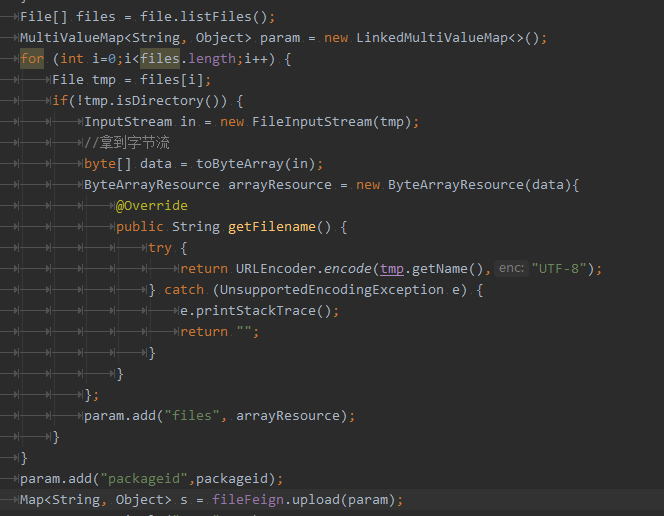SpringBoot,通过RestTemplate 或者 Spring Cloud Feign,上传文件(支持多文件上传),服务端接口是MultipartFile接收。
将文件的字节流,放入ByteArrayResource中,并重写getFilename方法。
然后将ByteArrayResource放入MultiValueMap中(如果是Feign调用,方法里传参就是MultiValueMap),
然后进行上传时,Spring会自动识别到Map中的文件数据,然后通过FormHttpMessageConverter,将数据转成form表单型的multipart/formdata请求。
这里有个坑!
Spring web 4里面的FormHttpMessageConverter在将文件转成formdata时,会将文件名转成Byte[],但是使用的编码却是写死 US-ASCII,该编码不支持中文,使用该编码转换后,中文变成?号,是无法转回来的。
我想到的解决方法:
1.将spring版本升到5,Spring5里面,该编码是可以传入修改的。Springboot,默认UTF8
2.客户端进行一次编码,比如URLEncoder。然后服务端进行Decoder。
贴部分代码:
Feign

调用方,使用Spring 的MultiValueMap类,将文件File 转成 Resource,如果多个文件,则可以循环 用 add 方法,放入一个key下。
MultiValueMap是允许一key多值的。
或者,将多个Resource放入list,然后将list put 进 map中。

接收方
接收,可以用
(MultiValueMap map)
如果有其他的 值。
则是(MultiValueMap map,String XXX,String AAA)
多文件,则是
(MultiValueMap[] map,String XXX,String AAA)
或者用对象接收,也可以,不需要 @RequestBody 注解,这个注解是接收 http body里的json的。
(Bean bean),bean对象里,则是 MultiValueMap[] map,String XXX,String AAA
====================== 分割线 =================================
我在查询Feign上传文件时,还查到了另一种方式,就是专门给Feign方式提供的feign form相关Jar包,
引入Jar包后,然后进行相关配置,便可以在Feign方法中,参数直接传递MultipartFile。
该方法,或许也可以解决Spring4的编码问题。
=================== 分隔线:2018-11-8补充 关于 feign form用法 ====================
先引入相关jar:
<dependency>
<groupId>io.github.openfeign.form</groupId>
<artifactId>feign-form</artifactId>
<version>3.2.2</version>
</dependency>
<dependency>
<groupId>io.github.openfeign.form</groupId>
<artifactId>feign-form-spring</artifactId>
<version>3.2.2</version>
</dependency>
@Bean
public Logger.Level feignLoggerLevel() {
return Logger.Level.FULL;
}
@Bean
public Encoder feignFormEncoder() {
return new SpringFormEncoder();
}
feign 调用方法 写法 :
save(@RequestPart MultipartFile file,@RequestParam("khbh") String khbh)但是如果,参数多时,一个一个写较为麻烦,可以用
save(Map<String,?> param)但是,经过测试,发现如果 map中value是null,会出现异常。(原因好像是因为,在将 值写入 formdata时,没有null判断)========== 上面的用的 feign form下面 有从网络上查到的,是类似于 feign form的解决方式:http://b-l-east.iteye.com/blog/2373462
糞坑-SpringCloud中使用Feign的坑
示例如下:
@FeignClient("service-resource")
//@RequestMapping("/api/test")
public interface TestResourceItg {
@RequestMapping(value = "/api/test/raw", method = RequestMethod.POST, consumes = "application/x-www-form-urlencoded")
public String raw1(@PathVariable("subject") String subject, // 标题
@RequestParam("content") String content); // 内容
}
说明:
*使用RequestMapping中的consumes指定生成的请求的Content-Type
*RequestParam指定的参数会拼接在URL之后,如: ?name=xxx&age=18
*PathVariable指定的参数会放到一个LinkedHashMap<String, ?>传入到feign的Encoder中进行处理,而在Spring中实现了该接口的Encoder为SpringEncoder,而该实现又会使用Spring中的HttpMessageConverter进行请求体的写入。
坑:
*不要在接口类名上使用RequestMapping,虽然可以使用,但同时SpringMVC会把该接口的实例当作Controller开放出去,这个可以在启动的Mapping日志中查看到
*使用默认的SpringEncoder,在不指定consumes时,PathVariable中的参数会生成JSON字符串发送,且默认情况下不支持Form表单的生成方式,原因为:FormHttpMessageConverter只能处理MultiValueMap,而使用PathVariable参数被放在了HashMap中。默认更不支持文件上传。其实已经有支持处理各种情况的HttpMessageConverter存在。
填坑:
*支持Form表单提交:只需要编写一个支持Map的FormHttpMessageConverter即可,内部可调用FormHttpMessageConverter的方法简化操作。
*支持文件上传:只需要把要上传的文件封装成一个Resource(该Resource一定要实现filename接口,这个是把请求参数解析成文件的标识),使用默认的ResourceHttpMessageConverter处理即可。
*支持处理MultipartFile参数:编写一个支持MultipartFile的MultipartFileHttpMessageConverter即可,内部可调用ResourceHttpMessageConverter实现,同时注意需要将其添加至FormHttpMessageConverter的Parts中,并重写FormHttpMessageConverter的getFilename方法支持从MultipartFile中获取filename
*所有的HttpMessageConverter直接以@Bean的方式生成即可,spring会自动识别添加
完美支持表单和文件上传:
方案一:
使用附件中的MapFormHttpMessageConverter.java和MultipartFileHttpMessageConverter.java
在Spring中进行如下配置即可
@Bean
public MapFormHttpMessageConverter mapFormHttpMessageConverter(MultipartFileHttpMessageConverter multipartFileHttpMessageConverter) {
MapFormHttpMessageConverter mapFormHttpMessageConverter = new MapFormHttpMessageConverter();
mapFormHttpMessageConverter.addPartConverter(multipartFileHttpMessageConverter);
return mapFormHttpMessageConverter;
}
@Bean
public MultipartFileHttpMessageConverter multipartFileHttpMessageConverter() {
return new MultipartFileHttpMessageConverter();
}
方案二:
使用FeignSpringFormEncoder.java
在Spring中配置如下:
@Bean
public Encoder feignEncoder(ObjectFactory<HttpMessageConverters> messageConverters) {
return new FeignSpringFormEncoder(messageConverters);
}
推荐使用方案一
方案二为参考https://github.com/pcan/feign-client-test而来,未测
上面方案中所用代码,贴在下面:
package com.access.service.saas.cmpt.utl;
import java.io.IOException;
import java.io.InputStream;
import java.util.ArrayList;
import java.util.Collections;
import java.util.List;
import org.springframework.core.io.InputStreamResource;
import org.springframework.http.HttpInputMessage;
import org.springframework.http.HttpOutputMessage;
import org.springframework.http.MediaType;
import org.springframework.http.converter.HttpMessageConverter;
import org.springframework.http.converter.HttpMessageNotReadableException;
import org.springframework.http.converter.HttpMessageNotWritableException;
import org.springframework.http.converter.ResourceHttpMessageConverter;
import org.springframework.web.multipart.MultipartFile;
/**
* @author elvis.xu
* @since 2017-05-09 11:17
*/
public class MultipartFileHttpMessageConverter implements HttpMessageConverter<MultipartFile> {
protected List<MediaType> supportedMediaTypes = new ArrayList<MediaType>();
protected ResourceHttpMessageConverter resourceHttpMessageConverter;
public MultipartFileHttpMessageConverter() {
supportedMediaTypes.add(MediaType.APPLICATION_OCTET_STREAM);
resourceHttpMessageConverter = new ResourceHttpMessageConverter();
}
public void setSupportedMediaTypes(List<MediaType> supportedMediaTypes) {
this.supportedMediaTypes = supportedMediaTypes;
}
@Override
public List<MediaType> getSupportedMediaTypes() {
return Collections.unmodifiableList(this.supportedMediaTypes);
}
@Override
public boolean canRead(Class<?> clazz, MediaType mediaType) {
return false;
}
@Override
public boolean canWrite(Class<?> clazz, MediaType mediaType) {
if (!MultipartFile.class.isAssignableFrom(clazz)) {
return false;
}
if (mediaType == null || MediaType.ALL.equals(mediaType)) {
return true;
}
for (MediaType supportedMT : getSupportedMediaTypes()) {
if (supportedMT.isCompatibleWith(mediaType)) {
return true;
}
}
return false;
}
@Override
public MultipartFile read(Class<? extends MultipartFile> clazz, HttpInputMessage inputMessage) throws IOException, HttpMessageNotReadableException {
return null;
}
@Override
public void write(MultipartFile file, MediaType contentType, HttpOutputMessage outputMessage) throws IOException, HttpMessageNotWritableException {
MultipartFileResource multipartFileResource = new MultipartFileResource(file);
resourceHttpMessageConverter.write(multipartFileResource, contentType, outputMessage);
}
public static class MultipartFileResource extends InputStreamResource {
private final String filename;
private final long size;
public MultipartFileResource(MultipartFile multipartFile) throws IOException {
this(multipartFile.getOriginalFilename(), multipartFile.getSize(), multipartFile.getInputStream());
}
public MultipartFileResource(String filename, long size, InputStream inputStream) {
super(inputStream);
this.size = size;
this.filename = filename;
}
@Override
public String getFilename() {
return this.filename;
}
@Override
public InputStream getInputStream() throws IOException, IllegalStateException {
return super.getInputStream(); //To change body of generated methods, choose Tools | Templates.
}
@Override
public long contentLength() throws IOException {
return size;
}
}
}
package com.access.service.saas.cmpt.utl;
import java.io.ByteArrayOutputStream;
import java.io.IOException;
import java.io.InputStream;
import java.io.OutputStream;
import java.lang.reflect.Type;
import java.nio.charset.Charset;
import java.util.Arrays;
import java.util.List;
import java.util.Map;
import feign.RequestTemplate;
import feign.codec.EncodeException;
import org.springframework.beans.factory.ObjectFactory;
import org.springframework.boot.autoconfigure.web.HttpMessageConverters;
import org.springframework.cloud.netflix.feign.support.SpringEncoder;
import org.springframework.core.io.InputStreamResource;
import org.springframework.core.io.Resource;
import org.springframework.http.HttpEntity;
import org.springframework.http.HttpHeaders;
import org.springframework.http.HttpOutputMessage;
import org.springframework.http.MediaType;
import org.springframework.http.converter.HttpMessageConverter;
import org.springframework.util.LinkedMultiValueMap;
import org.springframework.web.multipart.MultipartFile;
/**
* @author elvis.xu
* @since 2017-04-11 15:33
*/
public class FeignSpringFormEncoder extends SpringEncoder {
protected ObjectFactory<HttpMessageConverters> messageConverters;
protected HttpHeaders multipartHeaders = new HttpHeaders();
public static final Charset UTF_8 = Charset.forName("UTF-8");
public FeignSpringFormEncoder(ObjectFactory<HttpMessageConverters> messageConverters) {
super(messageConverters);
this.messageConverters = messageConverters;
multipartHeaders.setContentType(MediaType.MULTIPART_FORM_DATA);
}
protected static boolean isFormRequest(Type type) {
return MAP_STRING_WILDCARD.equals(type);
}
protected static boolean isMultipart(Object body, Type bodyType) {
if (isFormRequest(bodyType)) {
Map<String, ?> map = (Map<String, ?>) body;
for (Map.Entry<String, ?> entry : map.entrySet()) {
Object value = entry.getValue();
if (isMultipartFile(value) || isMultipartFileArray(value)) {
return true;
}
}
}
return false;
}
protected static boolean isMultipartFile(Object obj) {
return obj instanceof MultipartFile;
}
protected static boolean isMultipartFileArray(Object o) {
return o != null && o.getClass().isArray() && MultipartFile.class.isAssignableFrom(o.getClass().getComponentType());
}
@Override
public void encode(Object requestBody, Type bodyType, RequestTemplate request) throws EncodeException {
if (isMultipart(requestBody, bodyType)) {
encodeMultipartFormRequest((Map<String, ?>) requestBody, request);
} else {
super.encode(requestBody, bodyType, request);
}
}
/**
* Encodes the request as a multipart form. It can detect a single {@link MultipartFile}, an
* array of {@link MultipartFile}s, or POJOs (that are converted to JSON).
*
* @param formMap
* @param template
* @throws EncodeException
*/
private void encodeMultipartFormRequest(Map<String, ?> formMap, RequestTemplate template) throws EncodeException {
if (formMap == null) {
throw new EncodeException("Cannot encode request with null form.");
}
LinkedMultiValueMap<String, Object> map = new LinkedMultiValueMap<>();
for (Map.Entry<String, ?> entry : formMap.entrySet()) {
Object value = entry.getValue();
if (isMultipartFile(value)) {
map.add(entry.getKey(), encodeMultipartFile((MultipartFile) value));
} else if (isMultipartFileArray(value)) {
encodeMultipartFiles(map, entry.getKey(), Arrays.asList((MultipartFile[]) value));
} else {
map.add(entry.getKey(), encodeJsonObject(value));
}
}
encodeRequest(map, multipartHeaders, template);
}
/**
* Wraps a single {@link MultipartFile} into a {@link HttpEntity} and sets the
* {@code Content-type} header to {@code application/octet-stream}
*
* @param file
* @return
*/
private HttpEntity<?> encodeMultipartFile(MultipartFile file) {
HttpHeaders filePartHeaders = new HttpHeaders();
filePartHeaders.setContentType(MediaType.APPLICATION_OCTET_STREAM);
try {
Resource multipartFileResource = new MultipartFileResource(file.getOriginalFilename(), file.getSize(), file.getInputStream());
return new HttpEntity<>(multipartFileResource, filePartHeaders);
} catch (IOException ex) {
throw new EncodeException("Cannot encode request.", ex);
}
}
/**
* Fills the request map with {@link HttpEntity}s containing the given {@link MultipartFile}s.
* Sets the {@code Content-type} header to {@code application/octet-stream} for each file.
*
* @param map the current request map.
* @param name the name of the array field in the multipart form.
* @param files
*/
private void encodeMultipartFiles(LinkedMultiValueMap<String, Object> map, String name, List<? extends MultipartFile> files) {
HttpHeaders filePartHeaders = new HttpHeaders();
filePartHeaders.setContentType(MediaType.APPLICATION_OCTET_STREAM);
try {
for (MultipartFile file : files) {
Resource multipartFileResource = new MultipartFileResource(file.getOriginalFilename(), file.getSize(), file.getInputStream());
map.add(name, new HttpEntity<>(multipartFileResource, filePartHeaders));
}
} catch (IOException ex) {
throw new EncodeException("Cannot encode request.", ex);
}
}
/**
* Wraps an object into a {@link HttpEntity} and sets the {@code Content-type} header to
* {@code application/json}
*
* @param o
* @return
*/
private HttpEntity<?> encodeJsonObject(Object o) {
HttpHeaders jsonPartHeaders = new HttpHeaders();
jsonPartHeaders.setContentType(MediaType.APPLICATION_JSON);
return new HttpEntity<>(o, jsonPartHeaders);
}
/**
* Calls the conversion chain actually used by
* {@link org.springframework.web.client.RestTemplate}, filling the body of the request
* template.
*
* @param value
* @param requestHeaders
* @param template
* @throws EncodeException
*/
private void encodeRequest(Object value, HttpHeaders requestHeaders, RequestTemplate template) throws EncodeException {
ByteArrayOutputStream outputStream = new ByteArrayOutputStream();
HttpOutputMessage dummyRequest = new HttpOutputMessageImpl(outputStream, requestHeaders);
try {
Class<?> requestType = value.getClass();
MediaType requestContentType = requestHeaders.getContentType();
for (HttpMessageConverter<?> messageConverter : messageConverters.getObject().getConverters()) {
if (messageConverter.canWrite(requestType, requestContentType)) {
((HttpMessageConverter<Object>) messageConverter).write(value, requestContentType, dummyRequest);
break;
}
}
} catch (IOException ex) {
throw new EncodeException("Cannot encode request.", ex);
}
HttpHeaders headers = dummyRequest.getHeaders();
if (headers != null) {
for (Map.Entry<String, List<String>> entry : headers.entrySet()) {
template.header(entry.getKey(), entry.getValue());
}
}
/*
we should use a template output stream... this will cause issues if files are too big,
since the whole request will be in memory.
*/
template.body(outputStream.toByteArray(), UTF_8);
}
/**
* Dummy resource class. Wraps file content and its original name.
*/
static class MultipartFileResource extends InputStreamResource {
private final String filename;
private final long size;
public MultipartFileResource(String filename, long size, InputStream inputStream) {
super(inputStream);
this.size = size;
this.filename = filename;
}
@Override
public String getFilename() {
return this.filename;
}
@Override
public InputStream getInputStream() throws IOException, IllegalStateException {
return super.getInputStream(); //To change body of generated methods, choose Tools | Templates.
}
@Override
public long contentLength() throws IOException {
return size;
}
}
/**
* Minimal implementation of {@link org.springframework.http.HttpOutputMessage}. It's needed to
* provide the request body output stream to
* {@link org.springframework.http.converter.HttpMessageConverter}s
*/
private class HttpOutputMessageImpl implements HttpOutputMessage {
private final OutputStream body;
private final HttpHeaders headers;
public HttpOutputMessageImpl(OutputStream body, HttpHeaders headers) {
this.body = body;
this.headers = headers;
}
@Override
public OutputStream getBody() throws IOException {
return body;
}
@Override
public HttpHeaders getHeaders() {
return headers;
}
}
}
package com.access.service.saas.cmpt.utl;
import java.io.IOException;
import java.util.List;
import java.util.Map;
import org.springframework.http.HttpInputMessage;
import org.springframework.http.HttpOutputMessage;
import org.springframework.http.MediaType;
import org.springframework.http.converter.FormHttpMessageConverter;
import org.springframework.http.converter.HttpMessageConverter;
import org.springframework.http.converter.HttpMessageNotReadableException;
import org.springframework.http.converter.HttpMessageNotWritableException;
import org.springframework.util.LinkedMultiValueMap;
import org.springframework.util.MultiValueMap;
import org.springframework.web.multipart.MultipartFile;
/**
* @author elvis.xu
* @since 2017-05-09 10:58
*/
public class MapFormHttpMessageConverter implements HttpMessageConverter<Map<String, ?>> {
protected FormHttpMessageConverter formHttpMessageConverter;
public MapFormHttpMessageConverter() {
this.formHttpMessageConverter = new MultipartFormHttpMessageConverter();
}
public void addPartConverter(HttpMessageConverter<?> partConverter) {
this.formHttpMessageConverter.addPartConverter(partConverter);
}
@Override
public boolean canRead(Class<?> clazz, MediaType mediaType) {
return formHttpMessageConverter.canRead(clazz, mediaType);
}
@Override
public List<MediaType> getSupportedMediaTypes() {
return formHttpMessageConverter.getSupportedMediaTypes();
}
@Override
public boolean canWrite(Class<?> clazz, MediaType mediaType) {
if (!Map.class.isAssignableFrom(clazz)) {
return false;
}
if (mediaType == null || MediaType.ALL.equals(mediaType)) {
return true;
}
for (MediaType supportedMediaType : getSupportedMediaTypes()) {
if (supportedMediaType.isCompatibleWith(mediaType)) {
return true;
}
}
return false;
}
@Override
public Map<String, ?> read(Class<? extends Map<String, ?>> clazz, HttpInputMessage inputMessage) throws IOException, HttpMessageNotReadableException {
return formHttpMessageConverter.read(null, inputMessage);
}
public void write(Map<String, ?> map, MediaType contentType, HttpOutputMessage outputMessage) throws IOException, HttpMessageNotWritableException {
MultiValueMap<String, Object> multiMap = null;
if (map != null) {
if (map instanceof MultiValueMap) {
multiMap = (MultiValueMap<String, Object>) map;
} else {
multiMap = new LinkedMultiValueMap<>();
for (Map.Entry<String, ?> entry : map.entrySet()) {
multiMap.add(entry.getKey(), entry.getValue());
}
}
}
formHttpMessageConverter.write(multiMap, contentType, outputMessage);
}
public static class MultipartFormHttpMessageConverter extends FormHttpMessageConverter {
@Override
protected String getFilename(Object part) {
String rt = super.getFilename(part);
if (rt == null && part instanceof MultipartFile) {
return ((MultipartFile) part).getOriginalFilename();
}
return null;
}
}
}













